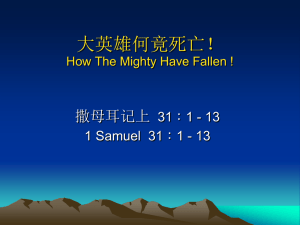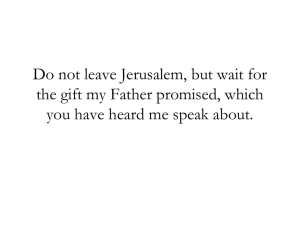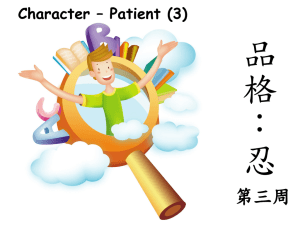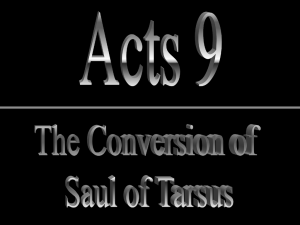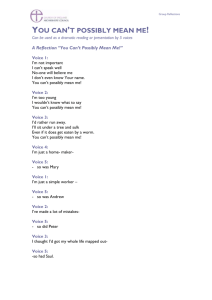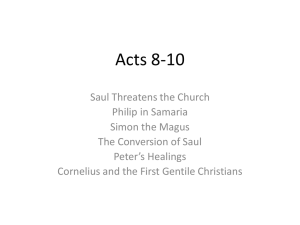Lesson Guide - SB Community Church
advertisement
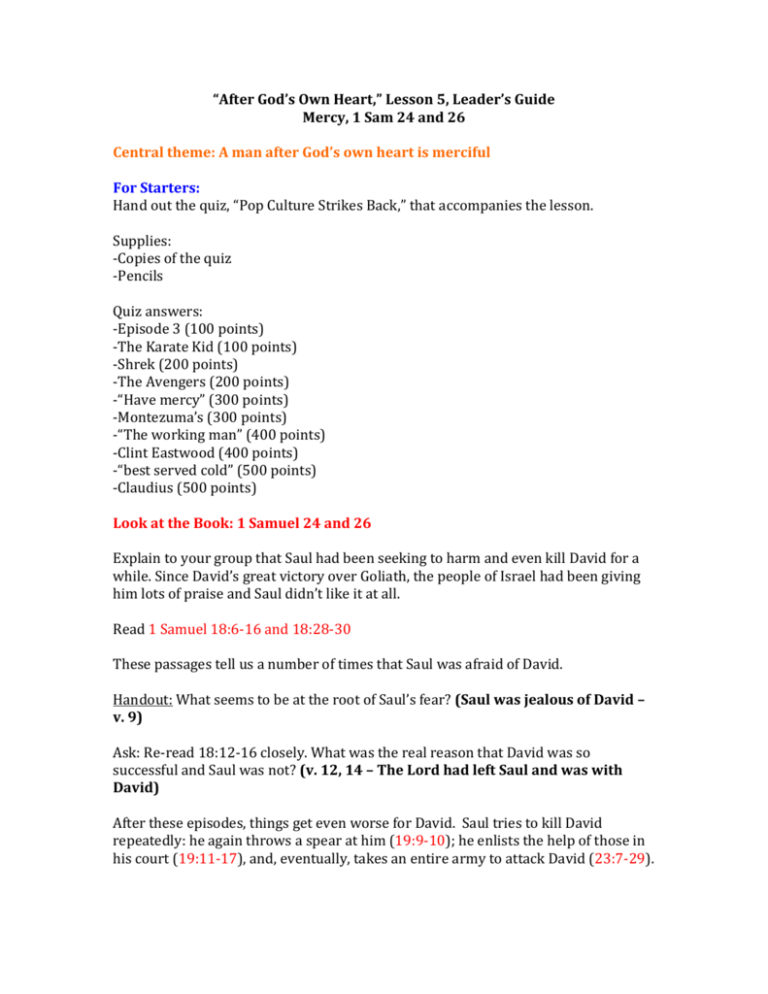
“After God’s Own Heart,” Lesson 5, Leader’s Guide Mercy, 1 Sam 24 and 26 Central theme: A man after God’s own heart is merciful For Starters: Hand out the quiz, “Pop Culture Strikes Back,” that accompanies the lesson. Supplies: -Copies of the quiz -Pencils Quiz answers: -Episode 3 (100 points) -The Karate Kid (100 points) -Shrek (200 points) -The Avengers (200 points) -“Have mercy” (300 points) -Montezuma’s (300 points) -“The working man” (400 points) -Clint Eastwood (400 points) -“best served cold” (500 points) -Claudius (500 points) Look at the Book: 1 Samuel 24 and 26 Explain to your group that Saul had been seeking to harm and even kill David for a while. Since David’s great victory over Goliath, the people of Israel had been giving him lots of praise and Saul didn’t like it at all. Read 1 Samuel 18:6-16 and 18:28-30 These passages tell us a number of times that Saul was afraid of David. Handout: What seems to be at the root of Saul’s fear? (Saul was jealous of David – v. 9) Ask: Re-read 18:12-16 closely. What was the real reason that David was so successful and Saul was not? (v. 12, 14 – The Lord had left Saul and was with David) After these episodes, things get even worse for David. Saul tries to kill David repeatedly: he again throws a spear at him (19:9-10); he enlists the help of those in his court (19:11-17), and, eventually, takes an entire army to attack David (23:7-29). Handout: Can you think of a time when someone treated you like their enemy and kept picking on you? How did it feel? How did you respond? Today, we’re going to see two examples of how David acted when given the chance to respond to Saul’s attacks on him. We’ll see, as we read, that… Handout: A man after God’s own heart is merciful. Read 1 Samuel 24:1-7. Amazingly, when David had the opportunity to kill Saul and end the troubles he’d been having because of him, he chose not to! In the rest of the chapter, David declares his allegiance to Saul and that he is unwilling to lift a finger against him to harm him. Saul, moved by David’s act of mercy, vows not to harm David, but it’s a vow he quickly forgets. Read 1 Samuel 26. (This is a rather long passage, but in order to fully understand David’s act of mercy, the whole thing needs to be read. You may need to stop your group from time to time during the reading and make someone summarize what’s happening to ensure their comprehension. Another fun way to tackle this passage would be to have your group pantomime it while you read it.) Twice, now, we’ve seen David show mercy and resist the urgings of others when he had the opportunity to kill Saul. (Optional teaching direction: Spend some time talking to your group about the voices that they listen to in their lives. David’s men were giving him what seemed like good advice from their perspective and nobody would have blamed him if he listened. Yet, his ears were tuned to God’s voice and through God’s eyes to kill Saul would have been wrong.) (Optional teaching direction: Talk to your group about self-control. In the midst of what had to be a tense and emotional situation, David controlled his actions and sought out God’s will and best.) Handout: Look through chapter 26 and make a list of all the titles that David uses for Saul in this encounter. (“the Lord’s anointed,” “my lord the king,” “my master,” “my father,” “the king of Israel,” “my lord”) In spite of all that Saul had done to trouble him, David still gives Saul a high level of respect. Why do think this is? (Let them suggest reasons) The reason David gives Saul such respect, in fact the reason that he is surprisingly merciful, is revealed by David’s use of the term “the Lord’s anointed.” Handout: Look again at 26:9-11. What do David’s words to Abishai tell us about his perspective? Just as we saw in the story about Goliath, David has a different perspective on the situation than the people around him. The people around him see Saul as a threat to be eliminated, David sees him as the Lord’s anointed one worthy of respect. So, David is merciful to Saul not because he is some great weakling—notice all the Philistine’s he’s already killed! No, David is merciful to Saul because he has God’s perspective on things. Read Luke 6:27-36 (Note: There is A LOT of Scripture in this lesson. If you feel like your group is fading on you at this point, just read 6:35-36. Although the examples of loving enemies and turning the other cheek can spark fantastic discussions, it might be worthwhile to simplify.) Handout: According to Luke 6:35-36, why should we be merciful? (Because God is merciful and kind even to the wicked and ungrateful) The Bible talks a lot about being forgiving and loving enemies, but we don’t often think of people in those terms. Although we may have someone we don’t get along with to whom we could show mercy, there may be people who need our mercy even if we don’t know them all that well. Mercy scenarios… Have your group talk about ways they could demonstrate mercy in each of these scenarios. Note: not all of these scenarios lend themselves to clear answers or responses. Let them wrestle with them a bit. Scenario 1: Tyler is a new kid at school. His dad is in the military, so he’s moved around a lot. Something like 8 times in 12 years. He doesn’t seem all that interested in making new friends, yet again. Scenario 2: Jennifer has a learning disability that makes it really tough for her to take good notes in class. Although she tries, she’s always falling behind the teacher. Since Mr. Lewis, the science teacher, always acts irritated when she asks him to repeat himself, she just doesn’t ask anymore. Scenario 3: Colton is teased all the time because he’s so short. Even his older brother makes fun of him when they see each other at lunch. Even though he doesn’t respond when people say stuff, it’s obvious that he hears them. Scenario 4: Scott’s dad lost his job three months ago and hasn’t been able to find a new one even though he looks for one every day. When all of the guys are talking at lunch about their new video games, Scott lies and talks about them, too, even though he doesn’t even have a video game system anymore. Scenario 5: Since Emily’s mom works two jobs and isn’t usually home in the afternoons, Emily has to help her younger brother with his homework and then make dinner before she can start on her own homework. She falls asleep in class a lot and keeps getting detention. Most of us won’t meet our enemy in the back of a cave. For most of us, these are the types of situations that will arise when we can be people of mercy. Handout: Think of some practical ways you can show mercy in your life. Think about life at home, school, other activities. Share one or two with the group. Optional activities: Have a “mercy war.” Arrange your group in a circle and have them play “mercy” with the people on each side. If someone calls “mercy,” they’re out. Play until one person remains. Plan a special game night featuring games like Risk, Stratego, Chess, etc. Point out later that at any time during those games, they could have chosen to be merciful to their opponent, but that’s not “the way the game is played.” Use this as an introduction to the way the world thinks of vengeance. Watch a few clips from the Karate Kid or Karate Kid part II, both of which talk about mercy. Good options include the dojo scene in KK (“mercy is for the weak”), the opening scene of KKII (Mr. Miyagi confronts the Cobra Kai sensei), or the end fight scene of KKII (“live or die?”).
